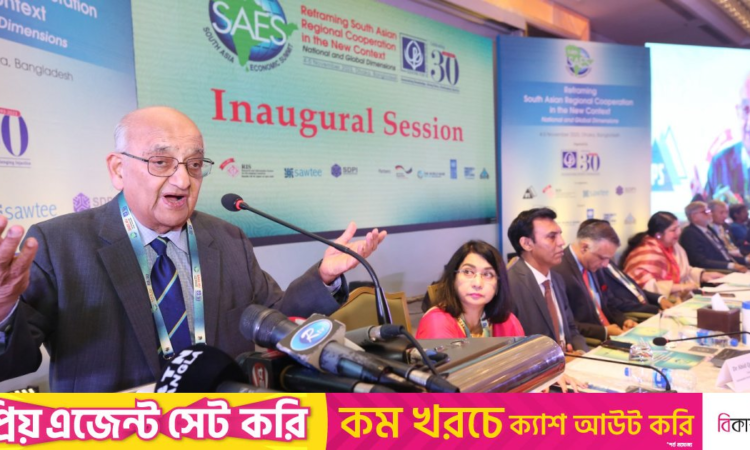
South Asia, like the rest of the world, is dealing with a strong dollar depreciating its currencies. Post-covid inflation, effects of the Russia-Ukraine war and climate change are making it clear how a strong dollar can bring on high inflation.
Experts think a unified currency could be the answer but due to several economic and political reasons, including a trust deficit among the countries of this region, South Asian countries are not able to use a common currency.
Economists on Saturday made these observations on the first day of a two-day summit on the 14th edition of the South Asia Economic Summit (SAEC), titled “Reframing South Asian Regional Cooperation in the New Context”, in Dhaka, hosted by the Centre for Policy Dialogue (CPD) in collaboration with think tanks from the subcontinent.
Prof Rehman Sobhan, chairman of the Centre for Policy Dialogue (CPD), said: “By ensuring free cross-border trade among South Asian countries, there is a huge opportunity to ensure the economic prosperity of the region. However, the lack of mutual trust in the free trade flow within the region is preventing that opportunity.”
“Most trade in the region is bilateral, and we are discussing ways to interact more closely at a time when South Asia is largely inactive as a region,” the veteran economist added.
Zahid Hussain, former lead economist at the World Bank’s Dhaka office, during a plenary session discussion on “Macroeconomic Cooperation and the Possibility of a Common Currency”, said: “South Asia is currently unsuitable for a currency union, but greater economic integration will increase the incentive for monetary cooperation. Terms of trade and financial shocks have become more common. There is a need to operate the already established regional financial cooperation frameworks more effectively, rather than reinventing forums.”
“One-way swaps cannot go on forever: outcomes depend on how the Reserve Bank of India (RBI) and PBC use the taka balances—import, invest, restructure to longer maturity debt, convert to hard currency. Bangladeshi banks holding rupee reserves are exposed to potential exchange rate losses. The rupee fluctuates more than the US dollar and the Yuan,” he explained.
At the plenary session, Abid Qaiyum Suleri, executive director, Sustainable Development Policy Institute (SDPI), Pakistan, said: “The time is not ripe for South Asia to have a common currency.”
Earlier, as chief guest of the inaugural session, Jatiya Sangsad Speaker Shirin Sharmin Chaudhury urged the private sector and corporations to increase investment to achieve targets set under the Sustainable Development Goals (SDGs).
She also said: “There is a $4 trillion investment gap in achieving the global commitment to the SDGs by 2030. A lot of thought is being put into how to mobilize the necessary resources and how countries can contribute within the framework of their national budgets.”
Bangladesh lagging behind
Planning Minister MA Mannan said: “Bangladesh’s exports to India are rising rapidly compared to other destinations. There is untapped potential for regional trade in South Asia, as only 8% of the region’s international trade takes place within the region itself.”
He emphasized the need to reduce trade and non-trade barriers, such as visa and countervailing duty requirements.
Fahmida Khatun, executive director of the CPD, presented a brief overview of the event.
In her welcome speech she said: “South Asian economies, like the rest of the world, are also battling to recover from the Covid-19 pandemic. The Ukraine war and subsequent global economic challenges are also having multi-dimensional impacts on South Asian economies.”
“Issues such as collective bargaining in global climate negotiation and alliances for technology transfer in view of the fourth industrial revolution, which have long-term implications for South Asian countries, have become important. Challenges of strategic positioning of smaller South Asian economies, in view of the changing economic and strategic alliances, also demand urgent attention.”
“In view of the pertinent economic and political scenarios, global circumstances, and the often-uncertain domestic political settlements, the 14th SAES will discuss the above mentioned issues in detail,” she added.
In another plenary session, titled “State of Regional Cooperation in South Asia: Revisiting Group of Eminent Persons (GEP) Report, New Context, Challenges, and Opportunities”, Ambassador Farooq Sobhan, distinguished fellow and board member of Bangladesh Enterprise Institute (BEI) and a former foreign secretary, said: “We do need not the vision but to implement that issue.”
P Nandalal Weerasinghe, governor, Central Bank of Sri Lanka; Yuba Raj Khatiwada, former finance minister of Nepal, and former governor, Nepal Rashtra Bank; Ishrat Husain, former governor, State Bank of Pakistan, former adviser to the prime minister on institutional reforms and austerity; Dushni Weerakoon, executive director, Institute of Policy Studies (IPS), Colombo; Paras Kharel, executive director, South Asia Watch on Trade, Economics and Environment (SAWTEE), Kathmandu; Abid Qaiyum Suleri, executive director, Sustainable Development Policy Institute (SDPI), Islamabad; Prof Sachin Chaturvedi, director general, Research and Information System for Developing Countries (RIS), New Delhi; Dr Debapriya Bhattacharya, distinguished fellow CPD; Mustafizur Rahman, distinguished fellow of CPD, also spoke at the event.






